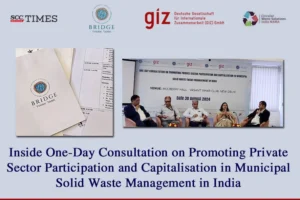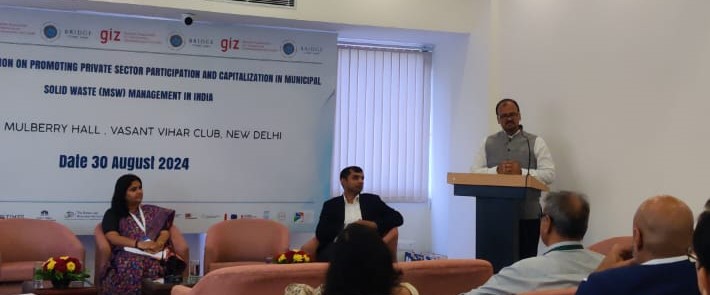Bridge is a non-profit organization based in New Delhi, engaged in assisting Government, Non-Governmental institutions, as well as regulators in policy-making, advocacy, research, and capacity building in the field of public policy. The key research areas of Bridge Policy Think Tank include Environmental, Social and Governance, Women and Education, Data Security, Privacy and Technology, and Heritage and Culture, amongst others. Bridge is associated with multiple national and international Government organisations, such as the Indian Institute of Corporate Affairs, MoHUA, International Financial Services Authority, GIZ, and many more.
GIZ is a German development agency that is largely funded by the Federal Ministry for Economic Cooperation and Development. It is implementing the “Waste Solutions for a Circular Economy in India” project with the Ministry of Environment, Forest and Climate Change (‘MoEFCC’) as nodal Ministry and MoHUA as the implementation partner Ministry.
Various experts from the fields associated with Solid Waste Management (‘SWM’) attended the event, wherein the opportunities, requirements, and peculiarities of the SWM sector were discussed with utmost zeal and passion for the crucial subject matter.
Inaugural Session
The event commenced with an Inaugural Session presided over by Jai Kumar Gaurav, Senior Advisor, GIZ — India, who was joined by Kritika Krishnamurthy, Director, Bridge Policy Think Tank and Founding Partner, AK & Partners; and the Guest-of-Honour, Mr. Binay Kumar Jha, Director, Swachh Bharat Abhiyaan (Clean India Movement), MoHUA, Government of India. The panel discussed the GIZ project progression and the successes and shortcomings of the Swachh Bharat Mission. Jai Kumar Gaurav talked about their programs, the most notable of which was the funding opportunities for entrepreneurs in the SWM sector, especially for those facing capital shortage to expand their operations. Further, he enlightened the participants about GIZ’s procurement of modern waste processing technologies for the municipal bodies across India, which are unable to efficiently process the increasing quantum of waste due to obsolete technology availability. Mr. Gaurav also put forth a remarkable suggestion of integration of informal sector with private players operating in waste management.
The Guest-of-Honour, Binay Kumar Jha proceeded with the discussion and highlighted the success of the Government with the various phases of Swachh Bharat Abhiyaan. However, Mr. Jha pointed out that the greatest requirement to achieve an enhanced and effective waste management is proper segregation. He said, “segregation is the mantra in SWM, but it is also the most challenging and difficult part of it”. He emphasised the need for awareness amongst the masses about appropriate segregation of waste.
The panel concluded the session by enlisting priority requirements for proper SWM, which are:
- Open land area to private SWM enterprises
- Robust finance structure for SWM enterprises and other stakelholders
- Clear and concise user-charges policy
-
Incentivising households for proper waste segregation
The event progressed further in three Roundtable Consultation Sessions, themed as under:
Session I: Promoting Private Sector participation and capitalisation in the MSW Management Sector
This session was moderated by Jai Kumar Gaurav, who was joined by Dr. Radha Goyal, Deputy Director, Indian Pollution Control Association (‘IPCA’); Abhijeet Sirkar, Managing Director, Apro Greentech Pvt. Ltd.; Dr. Suneel Pandey, Director, Circular Economy and Waste Management, The Energy and Resources Institute (‘TERI’); and Rajesh Chaudhary, Director, Cogo Eco-tech Solutions Pvt. Ltd.
The panel was faced with the question, “what areas of SMW are attractive for investors?” However, the panel acknowledge that the answer is not as simple, as there are many things that could be done at unit levels, before the waste reaches private waInside ste management enterprises.
The panel’s opinion was that private SWM aggregators’ greatest challenge is the absent or improper segregation of waste at unit level-such as households. Further adding to that challenge is the lack of awareness amongst the waste collection staff regarding depositing and disposing segregated waste separately. Therefore, segregation costs of private enterprises could be substantially reduced at ground level through smart and proper segregation at households, and reciprocated waste collection. This will be lucrative for private enterprises to be involved more actively in and secure investments for expansion of operations.
Dr. Radha Goyal from IPCA, who has been working with various residential complexes, townships, and residential societies in Delhi, stated that a major portion of waste processing could be done at the society levels. She suggested the same with respect to ‘organic waste’ and stated that affordable technologies are available for organic waste treatment within such communities; other components of community waste could be treated by IPCA.
Taking the discussion further, Dr. Suneel Pandey from TERI contributed by stating that currently, waste aggregators are remunerated based on the tonnage of waste aggregated by them. However, their remuneration shall be incentivised based on the level of waste segregation performed.
Abhijeet Sirkar shared his experience with SWM and stated that the waste management problems are further aggravated by Methane emissions from waste lying unattended. He mentioned that although Methane dissipates faster, however, 1 tonne of Methane is equivalent to 30 tonnes of Carbon. He mentioned that municipal bodies’ funds are majorly usurped by operating costs, therefore, the private sector needs to be active in this area.
Rajesh Choudhary also emphasised that to scale-up effective SWM, privatisation is undoubtedly required. He mentioned that the technology that his enterprise has developed is a no-waste technology that utilises SMW of all forms and converts it into fuel. However, it is to some extent an expensive technology, and the expansion of the use of such technology would be better enabled through increased private participation.
Concluding Session I, Mr. Sirkar stated that, ‘every person expert in a respective field must take some time out to aid their city by applying their expertise; do it for the generations to come to make their lives better.’
Session II: Exploring the Public Sector’s contribution to facilitate innovate technologies and frameworks for SWM in India
The panel for this session comprised of Kumar Ankit, General Counsel and Vice-President, Shree Cement Ltd.; Dr. Manoranjan Mohanty, Advisor/Scientist, Office of the Principal Scientific Advisor to the Government of India; and Anu Khandelwal, Founder & CEO, Newcycl. The moderator for this session was Anuroop Omkar, Director, Bridge Policy Think Tank & Founding Partner, AK & Partners.
The discussion opened with the issue of ‘single-use plastic’. Kumar Ankit spearheaded the discussion by discussing the scope of waste management by the cement industry. He stated that, ‘cement industry has more capacity to utilise plastic waste than all other industries combined.
However, he stated that enough raw material from MSW is not reaching the aggregators for recycling and reusing. He stated many reasons for the same, such as improper dumping, recycling and self-consumption at the ground level by scrap-hawkers, rag-pickers and waste collectors.
Ms. Khandelwal that for an effective SWM policy, there shall be proper categories assigned to waste, and category-specific policies shall be developed by the Government.
A question was raised regarding MSW’s impact on Climate Change, to which Dr. Mohanty responded by stating that MSW does have a positive effect on climate change if managed properly. However, ineffective waste management leads to generation and release of carbon in the atmosphere; therefore, inclusion of carbon-removing and carbon-trapping technologies in the waste management sector could be helpful.
Mr. Ankit further contributed by stating that to improve SWM in the country, the following measures are required to be taken by the Government towards waste management aggregators:
- Disincentivise fossil fuel usage
- Promote tech-absorption
-
Novel taxation policy
Anuroop Omkar concluded on the note that, ‘there is a need for greater advocacy and soft-power campaigning for creating awareness dedicated to changing the general psychology regarding waste management.’
Special Address by Biotechnology Industry Research Assistance Council (‘BIRAC’)
Dr. Jitendra Kumar, Managing Director at BIRAC, delivered a special address at the Consultation. He emphasised that, ‘domestic development of MSW management technology is crucial for serving the Indian case.’ To exemplify, he displayed several notable examples before the audience of enterprises who had displayed satisfactory technological endeavours, and ultimately secured the funding by BIRAC. Dr. Kumar also invited members from the audience to approach BIRAC if they had ideas for waste management.
Session III: Discussing the role of women and informal sector in India’s waste management landscape focusing on their contributions, problems, and opportunities
The concluding session of this One-Day Consultation was moderated by Vikas Lakhani, Advisor, Bridge Policy Think Tank and Ashoka Globalizer. Those who joined him were Swati Singh Sambyal, Expert, Capacity Development Global Waste GRID-Arendal; Vineeta Hariharan, Public Policy Exponent and Former Chief of External Missions at the Ministry of Micro, Small and Medium Enterprises; and Dr. Dhawal Gupta, Group Business Director at CHASE India and Former Scientist E & Head (Cyber Policy), Cyber Law, Government of India.
The discussion was opened by Ms. Sambyal, who cited the example of another country like India from the Global South-Republic of South Africa, that has been a contemporary of India in introducing waste management policies.
Enlightening the audience about the South African policy, she stated that their policy mandates the informal sector waste collectors to be officially registered with the local Government bodies; and waste generating units, such as residential complexes, industrial complexes, business parks etc., are required to appoint such registered waste collectors who shall be paid fairly by the waste generators.
She emphasised that India could learn from this example and in fact, all of Global South could learn from each other’s experiences, as waste management is a peer-learning process.
She also brought the discussion home while discussing the role of women in waste management by citing the success stories of Ambikapur, Chhattisgarh, where a collaboration of over 400 women spearheading waste collection, segregation and management in the city, is creating not only jobs, but also generating revenue by selling the collected waste to recycling vendors and the cement industry. These women are locally known as “Swacchta didis”, and avail several benefits, such as operative bank accounts, revenue distribution, and social security. Further, she also cited the SWaCH Pune cooperative, that is entirely owned by self-employed waste collectors and other urban poor.
Dr. Dhawal Gupta also emphasised for a proper policy for greater integration of informal sector in India’s waste management. He stated that while framing a policy for such cause, certain questions are requiring to be answered priorly:
- Whether the policy recommended process is transparent to the last mile?
- Whether the policy is accountable with respect to all stakeholders?
-
Whether and how important is incentivisation for the effective implementation of the policy?
He concluded the discussion on the front of technology integration into the process and stated that proper skilling of the informal sector engaged in waste management is required, and it could be achieved through AI integration. He cited the example of the BHASHINI initiative of Ministry of MSME, that effectively translates data to numerous Indian languages. He suggested that for skilling in SWM sector, something of the similar nature could be introduced. Lastly, he pushed for domestic development of AI technology that is compatible with Indian languages and speaking mannerisms.
On the note of technology integration, social awareness, social upliftment and recognition in the SWM domain, this One-Day Consultation was successfully concluded.
Kritika Krishnamurthy thanked the panelists and the audience for participating. It is of utmost importance to mention that Bridge Policy Think Tank took the opportunity to conduct a survey on the understanding, suggestions and opinions of the attendees on the issues related to SWM. The feedback of the attendees was appreciated by Ms. Krishnamurthy; and at this note, she declared the Consultation closed.


